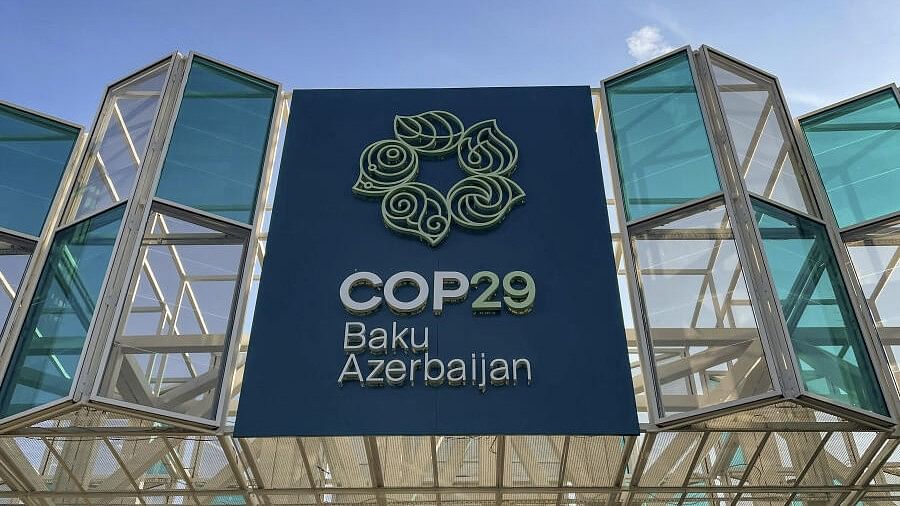
A view shows a venue of the COP29 United Nations climate change conference, in Baku, Azerbaijan.
Credit: PTI File Photo
By Mark Gongloff
Watching another chaotic United Nations climate confab end in disappointment brings to mind that old saw, incorrectly ascribed to Winston Churchill, about America always doing the right thing, but only after it has exhausted every alternative. Except in this case the world’s polluting nations are stuck in the “exhausting alternatives” phase and are quickly running out of time to do the right thing.
We can at least be glad that COP29 — this year’s conference for the UN Framework Convention on Climate Change, held in Baku, Azerbaijan — didn’t end in complete disaster like 2009’s gathering in Copenhagen. After days of bare-knuckle brawling and the near-collapse of negotiations, the bloodied parties staggered away with a commitment from developed nations to triple the amount of money they spend to help developing countries mitigate and adapt to global heating, to $300 billion from $100 billion per year, by 2035. They also vowed to put together a decade-long “roadmap” for hitting the $1.3 trillion in annual financing that poorer countries had demanded. And they established a global carbon-credits market and paid vague homage to a pledge made last year to transition the global economy away from fossil fuels.
This outcome is, to put it mildly, insufficient. To put it not so mildly, it’s pathetic. Even the $1.3 trillion developing nations wanted would have fallen far short of the $2.4 trillion truly needed, according to an estimate by the UN’s Independent High-Level Expert Group on Climate Finance. The clean-energy transition alone could cost $215 trillion by 2050, according to BloombergNEF.
So countries that have emitted almost none of the greenhouse gases heating up the planet but will suffer the brunt of the consequences will end up at least $2 trillion per year short and a decade away from relief. Compared to the $7 trillion in estimated explicit and implicit subsidies the world pays fossil-fuel producers every year, that $300 billion looks even more insulting.
“The $300 billion so-called ‘deal’ that poorer countries have been bullied into accepting is unserious and dangerous — a soulless triumph for the rich, but a genuine disaster for our planet and communities who are being flooded, starved, and displaced today by climate breakdown,” Oxfam International’s climate change policy lead, Nafkote Dabi, said in a statement. “The destruction of our planet is avoidable, but not with this shabby and dishonorable deal.”
Almost as infuriating as the deal’s inadequate sums is its composition. Too much of that $300 billion will come in the form of loans, which will further burden countries already staggering under too much debt. Together, the poorest pay about $70 billion per year in debt servicing costs to richer countries, including the backers of multilateral development banks such as the World Bank, according to the Brookings Institution. That cancels out the bulk of the $100 billion climate-finance commitment that rich countries made in 2009 but have only belatedly begun to fulfill. Instead of piling on more debt, rich countries should be canceling it.
And much of what’s purchased with that $300 billion might be the equivalent of chicken wire and wet newspaper. The World Bank has failed to account for the real climate impact of between $24 billion and $41 billion of its financing over the past seven years, according to Oxfam. The bank registers projects at the time of approval rather than at the time of completion, meaning many works of dubious climate benefit — think gelato shops and coal plants — go on the books as “climate finance.”
Haggling over such relatively petty sums while the world burns is short-sighted and self-defeating. It betrays upside-down priorities that often favor the fossil-fuel producers and rich petrostates that increasingly dominate COP negotiations. The president of COP29’s host country called oil and gas “a gift of God,” and Saudi Arabia was described as a “wrecking ball” in negotiations.
It’s enough to make you wonder why we should keep holding COPs at all. Several climate leaders, including former UN Secretary-General Ban Ki-Moon, published an open letter at the start of COP29 calling to overhaul the process. “It is now clear that the COP is no longer fit for purpose,” they wrote. “Its current structure simply cannot deliver the change at exponential speed and scale, which is essential to ensure a safe climate landing for humanity.”
Major polluters such as the US, China and the European Commission didn’t bother to send leaders to Baku. COP30, in Brazil, will take place during the first year of the second term of once-and-future President Donald Trump, a climate-change denier who plans to pull the US out of the Paris accords (again). At a time when the goal of holding global warming to 1.5 degrees Celsius of warming above pre-industrial averages is essentially dead, the political mood around the world seem to have soured on aggressive climate action.
And yet COPs, even in their present unfit state, are still essential. Requiring buy-in from everybody from the Marshall Islands to Exxon Mobil Corp. is a recipe for agonizingly slow progress, but it at least keeps the conversation going.
And as my Bloomberg Opinion colleague David Fickling has written, the commitments made in these talks still produce benchmarks that governments take seriously. Otherwise, why would there be so much ferocious haggling over them? Everybody could simply pledge to spend eleventy gazillion dollars and hit Net Zero by next Tuesday and call it a day. That they don’t is actually a cause for hope, if you look at it the right — or naive - way. But being hopeful isn’t the same as ignoring that COP29 makes clear the world is still not taking the climate threat seriously enough.